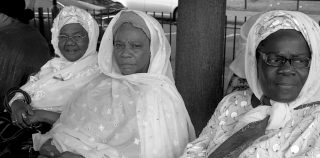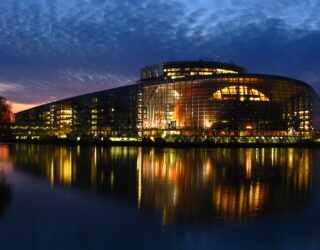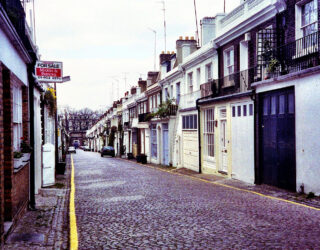On Saturday 18th March at the Rich Mix in London, Everyday Muslim brings together speakers from academia, the arts, media organizations, heritage and more in the first event of its kind to interrogate the constructions of Black Muslim identity and how their everyday life has been represented and archived. The day includes presentations, spoken word, a photographic exhibition as well as an Open Mic section for the audience to add their voice.
“What we did find reflected a narrow and fundamentally colonial perspective of migration”
It aims to explore the different mediums of representing black Muslim history and heritage, why exploring and archiving the past matters, the significance of sharing stories and experiences, a debate about labels as well as being a forum to launch Everyday Muslim’s new archiving project.
Sadiya Ahmed, Founder and Director of Everyday Muslim, told us more about the thinking and motivations behind the symposium, why it’s important to bring together a diverse range of voices and upcoming projects they have planned.
Everyday Muslim’s first archive project began in 2014 and was based on the ‘South Asian’ community, which represents the majority ethnic group within the Muslim community and as Sadiya highlights “is usually who the wider society would expect to represent the ‘British’ Muslim community”. Given this more apparent position, they had initially expected to uncover much more references to the community in the local, national and film archives than they eventually found.
“What we did find reflected a narrow and fundamentally colonial perspective of migration and others of racial tensions spanning recent decades. In other words, they didn’t reflect the realities and nuances of the community’s lived experience and their own voices are definitely absent. This lead me to ponder that if the voices of the majority community aren’t represented then what would happen to the narrative of one of the smaller and most diverse within the UK’s Muslim community – the black Muslim community, which is a combination of African born, British born and those with Caribbean roots.”
Their approach creates space for a diverse discussion beyond ‘token’ additions to panel discussions or TV debates
Discovering this absence drove Sadiya and her team to turn their research towards addressing it, hoping to raise the representation, understanding and documentation of black Muslim experiences and histories in the UK. They started by engaging and recruiting members of the community to support the project, mainly through recording and archiving their own stories, bringing their voices to the fore. This research has now been ongoing for the last eighteen months.
“The insight we gained into the lives of the black Muslim community in the UK increased our aspiration to share, preserve and represent their narrative to reflect the diverse range of ethnic and cultural experiences”
Everyday Muslim have worked to give voice where it is lacking and provide space to discuss topics and experiences that are often hidden from the dominant writing of history. Of equal importance, their projects become a space of self-reflection, of a community having the ability to see their experiences reflected back to them. Sadiya emphasized the need to bring in as broad a range of voices as possible to explore and acknowledge the diversity of communities and cultures. Externally these are often presented as ‘singular’ through simplistic and harmful stereotypes. This approach, of creating space for a diverse discussion beyond ‘tokenism’, is embedded in their upcoming symposium, as Sadiya explained:
“The symposium will be the first of its kind ever to represent the black Muslim community as a specific group in the context of history and heritage. It appears that they are and inevitably feel that their stories are not represented or valued in the wider British, black British or Muslim community. We have tried to include people from various social backgrounds and representatives from different groups that make up the community as well as born and convert Muslims. We structure our events to appeal to and include community, individuals, academia, students, artists and media.”
To understand these histories and experiences as separate from ‘British’ history is a fundamental part of the erasure of their voices
The diversity of voices brought together for the symposium reflects the notion that history is not the sole concern of historians or academics but also a part of the everyday – it is owned, shaped and understood differently by each individual and written in practice through their actions and interpretations. Everyday Muslim’s symposiums seek to provide a platform to explore these complex processes.
“The program will explore identity, personal memories, the significance of our everyday lives, actions and decisions as well as the social and political environment while helping to inform future generations of how and why these past undertakings can influence them. It will be an occasion to also consider more traditionally ‘difficult’ truths around the labels used to define the black Muslim community by the wider society and their own communities as well as to explore the expressions of their self-identity.”
While the symposiums and archiving projects provide a vital space for reclaiming and sharing hidden stories, archiving them and ensuring they are not lost, they exist within a broader social and political landscape. To understand the histories and experiences of black Muslims and the wider Muslim community in the UK as somehow separate from ‘British’ history is a fundamental part of the erasure of these voices in the first place.
Defining a nation’s history is a process fraught with violence, erasure and often arrogance that clouds past and ongoing harm
Sadiya highlights that their work is rooted in ‘documenting’ history and heritage, reflecting a diversity of opinions and experiences rather than seeking to form them, trying as best as possible to avoid bias. Bringing these stories and histories to the surface however and exploring their complex entanglement with the wider society inevitably disrupts and complicates the construction of ‘British’, demanding those who see people who are different to them as distant to reconsider how their histories are connected.
Defining a nation’s history and the story it tells itself to understand who it is, is a process fraught with violence, erasure and often arrogance that clouds an acknowledgment of past and ongoing harm. Proper representation and inclusion of voices that are pushed out of dominant narratives should go deeper than simply ‘adding’ to our understanding or token inclusion on a panel or in a television debate – it demands a retrospective re-assessment.
“We exist, we are here, we’ve been here for a long time”
Discussing and archiving these histories is valuable work itself. Opening it to wider audiences through public exhibition offers spaces to encounter the intersections between personal histories and the experience of living in a nation that speaks much of its multiculturalism while simultaneously being unwelcoming or outright hostile. As Momtaza Mehri writes, being black, British and Muslim means navigating a “precipice few would want to tiptoe in 21st century Britain: the two-pronged realities of unbridled Islamophobia and established racism”.
Everyday Muslim’s forthcoming project, The Heritage Story of British Black Muslims in London, cuts across much of these processes:
“The inter-generational oral history and research project will explore, document and archive the memories and experiences of a diverse British black Muslim community in the London Borough of Brent, from a historical perspective to the present day, making them available to wider audiences. As it spans three generations it will provide valuable testimony of the ways in which the community have sought to maintain their religion, culture, heritage and identity in an unfamiliar and sometimes hostile society.”
The significance of documenting these experiences is clear, as emphasized by photographer and exhibitor Wasi Daniju: “[W]e exist, we are here, we’ve been here for a long time and you need to be able to see us. We’re not going to be as easily erased from the narrative and from future narratives as maybe you would like to happen.”
Image: Wasi Daniju



